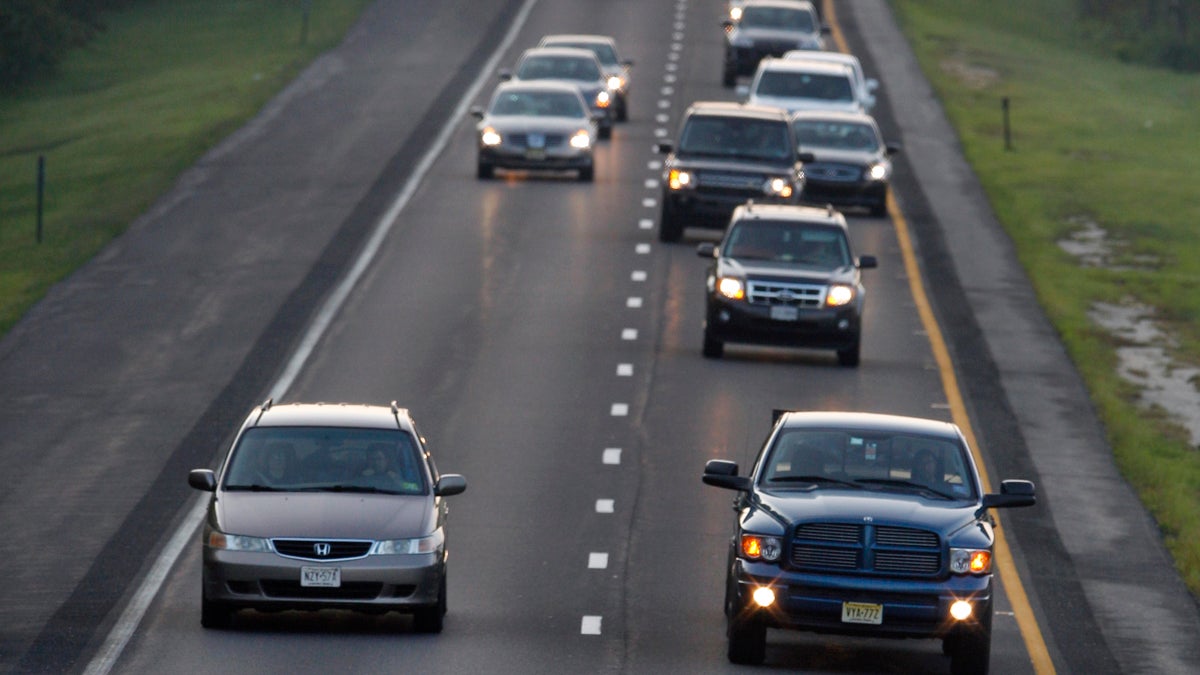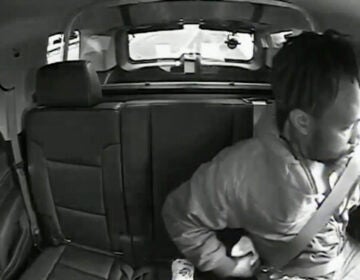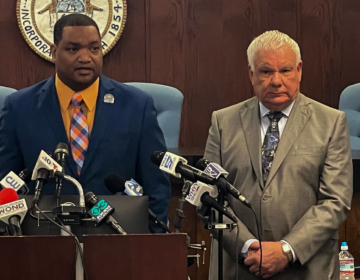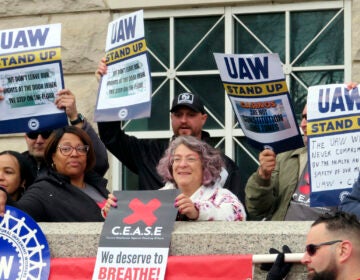Atlantic City, Pleasantville police to pilot a new approach to traffic stops this summer
The South Jersey police departments will participate in a Stockton University project to field test a concept known as “procedural justice” in the U.S. for the first time.

The westbound lanes of the Atlantic City Expressway. (Mel Evans/AP Photo)
Some police officers in South Jersey will be trying a new approach to traffic stops aimed at building relationships with the communities they serve.
The departments in Atlantic City and Pleasantville will be participating in a Stockton University project to field test a concept known as “procedural justice” in the U.S. for the first time. The U.S. Department of Justice also awarded a $700,000 grant for the study.
“We’re just trying to find new ways for the police to interact with the public,” said Dr. Nusret Sahin, associate criminal justice professor at Stockton.
“Let’s say you were a driver and you’re speeding,” he explained. “The officer will listen to you and give a voice, which means that you will have an opportunity to express what’s happened, why you were speeding.”
Sahin said the officer will try to understand the driver’s side of the story during the interaction.
“And at the end, [the officer] will give you a pamphlet that includes what the crash statistics look like in that city, and he will say that you will have access to our body-worn camera footage,” he said.
The overall goal, according to Sahin, is educating the driver while being transparent about why officers conduct traffic stops.
“We believe that police-citizen relations could be enhanced through these interactions,” he said. “Officers could know their communities better if they spend more time with the drivers and if they are becoming more accountable to the public. This will enhance their legitimacy.”
The concept, conceived by Yale professor Tom Taylor, is one of the recommendations made by the 21st Century Policing Task Force under former President Barack Obama’s administration. The concept has received new attention as law enforcement agencies across the country look for ways to rebuild police-community relations in the wake of incidents like the police murder of George Floyd in Minneapolis.
In particular, traffic stops, even for minor infractions, have frequently led to confrontations between police and members of the public — sometimes deadly ones — especially people of color. That has led some cities, including Philadelphia, to ban the practice.
Racial profiling of Black drivers by state troopers on the New Jersey Turnpike has been an issue for decades. Under a federal consent decree that ended in 2009, New Jersey had agreed to certain reforms, including training and monitoring. However, according to an NJ Advance Media analysis of state data going back 12 years, state police were still more likely to issue tickets to Asian, Black, and Hispanic drivers than white drivers. White drivers were ticketed a little more than 40% of the time, while Black drivers were ticketed nearly 44% of the time, Hispanic drivers almost 51%, and Asians nearly 56%.
Sahin, a former police officer, conducted a similar exercise in his native Turkey, based on an experiment in Australia.
The experiment in Turkey took place in the spring of 2013 in Adana, a major city in the southern part of the country. The more than 700 motorists stopped by police for speeding violations were split into two groups: a control group whose traffic stops were “business-as-usual” and an experimental group who received procedural justice interventions.
“We found that people [in the experimental group] were more satisfied and people expressed more trust through officers interacted,” he said of the results of that study.
Because procedural justice has never been field-tested in the United States at this point, according to Sahin, it remains a largely little-known concept.
Pleasantville Police Chief Sean Riggin said it wasn’t a difficult decision for his department to participate, calling it a “natural extension” of their work.
“This is completely in line with what our whole sort of organizational mojo is about,” he said.
However, some advocates are cautious.
“I’m learning about this along with the public,” said Yannick Wood, director of criminal justice reform at the New Jersey Institute for Social Justice. “But there’s certain things that I already know as working in [the] criminal justice space in New Jersey … that car stops are not the same for all residents.”
Wood said he is concerned that Black and Latino drivers will continue to disproportionately receive more traffic summonses compared to other groups.
“My concern with this particular study is that I don’t think it goes far enough in addressing what the root concern is,” Wood said. “The root concern is the nature of the relationship between the police in their community and the community itself.”
Wood adds that the best way to have interactions with police officers, particularly in communities of color, is to limit those interactions.
“We need to actually ask ourselves, do the police need to be involved in traffic stops?” he said. “Do they need to be involved in enforcing traffic vehicle violations when we have traffic agents who are not carrying firearms, who could be doing that, or we have traffic technology like red light cameras or speed cameras that could actually do that same work and that do not have the type of racial lens that it seems that officers may have?”
Sahin said planning for the study will begin in January, with the pilot program starting in the summer for an 18-month observation period. The researchers will monitor about 2,000 traffic stops in Atlantic City and Pleasantville during that time frame.

Get daily updates from WHYY News!
WHYY is your source for fact-based, in-depth journalism and information. As a nonprofit organization, we rely on financial support from readers like you. Please give today.







